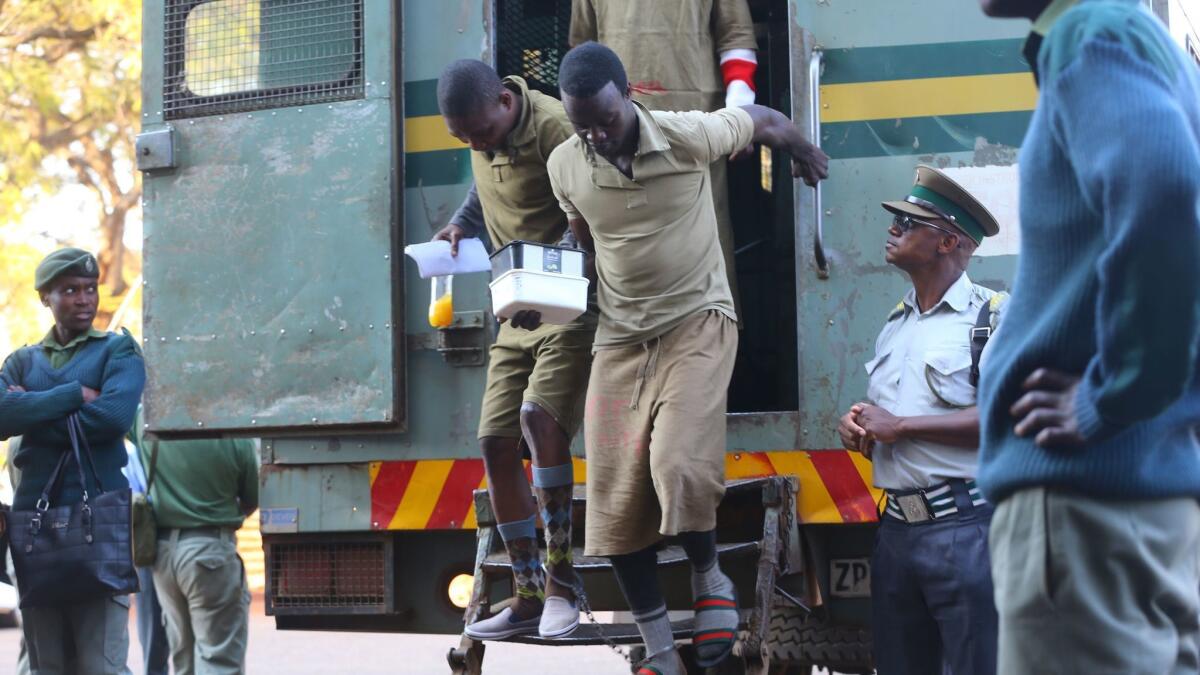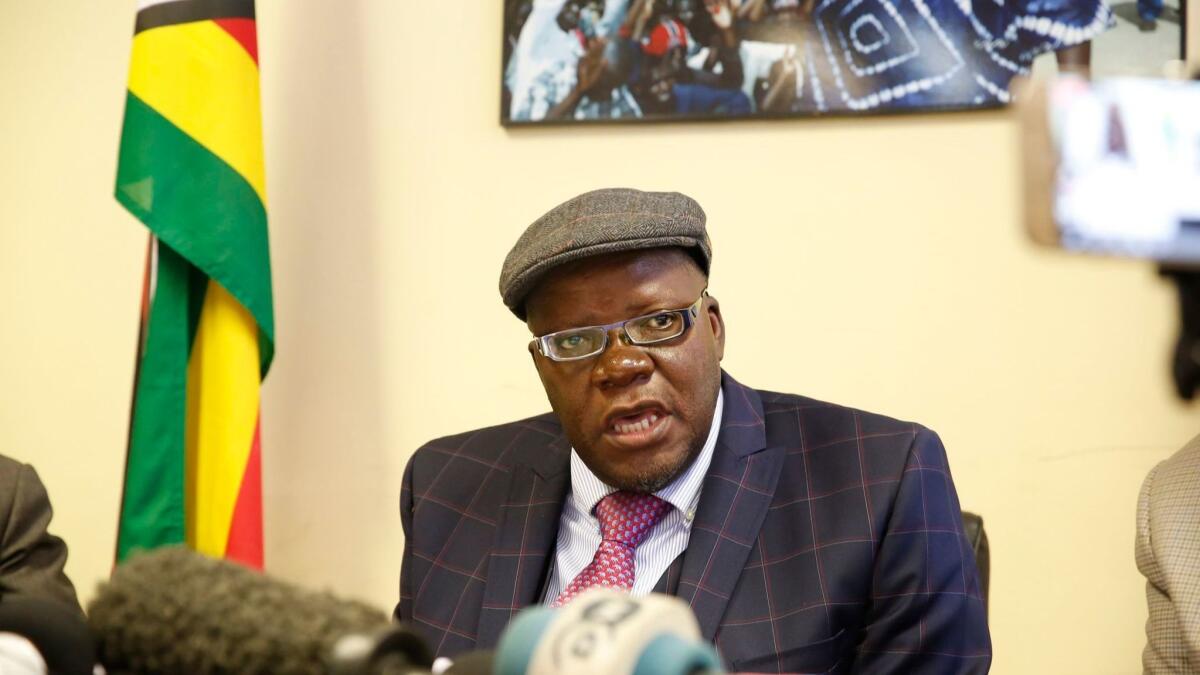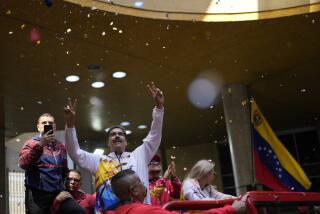Fears of Zimbabwe government crackdown persist for opposition activists and others after election

The truck driver had just come off his shift in Chitungwiza, a satellite town of Zimbabwe’s capital, when soldiers ordered him and a colleague out of their vehicle.
The soldiers, about 15 of them, accused the driver of opposing the government and beat him with iron bars until he lay on the ground crying, the man said in an interview Wednesday.
“They said we had been burning things and tearing down posters of the president in Harare,” the capital, said the man, who gave his first name as Wonderful, but who declined to provide his last name because of safety concerns. “I’ve never been politically active.”
Hours earlier — just days after millions of Zimbabweans voted peacefully in national elections — the army had launched a bloody crackdown on opposition supporters in downtown Harare, opening fire on a demonstration and killing six people.
Zimbabwe officials last week declared President Emmerson Mnangagwa and his ruling ZANU-PF party the winners in the July 30 election, which was expected to lift the country out of its self-imposed isolation and economic crisis.
Mnangagwa, who took over as president in November after longtime President Robert Mugabe was ousted by the army, has pledged to bring a “new era” to Zimbabwe, despite having been in Mugabe’s government for decades.
He has promised a free and fair vote, and on polling day, voters agreed it was the most open atmosphere they could remember after years of turbulent elections, particularly a wave of postelection violence in 2008.
But Nelson Chamisa, the leader of the opposition Movement for Democratic Change party, has called the official results “fake” and says he won the popular vote according to his party’s tallies. His party plans to file a legal challenge of the official results in Zimbabwe’s courts, potentially delaying Mnangagwa’s inauguration, which has been set for Sunday.
In the last week, Chamisa’s party and human rights groups say the country’s security forces have been systematically targeting opposition leaders and supporters. Scores of people have been arrested, harassed and beaten, they say, and the optimism of election day has been eclipsed by a familiar sense of guardedness and fear.
Mugabe was one of the last post-colonial autocrats of Africa, and when he resigned under pressure in November, throngs of people took to the streets to celebrate. Now, the army that people were thanking for forcing his exit faces its own accusations of violent repression.
In an unusually strong statement Tuesday, several diplomatic heads of mission in Zimbabwe, including the U.S., condemned the “violence, attacks and acts of intimidation targeted at opposition leaders and supporters” and called on the government to ensure the Zimbabwean army “act with restraint.”
“These human rights violations have no place in a democratic society and contravene the fundamental tenets of international human rights standards,” the statement said.
“Before Aug. 1, it was much better than ever before,” said Douglas Mwonzora, one of the Movement for Democratic Change party’s top officials. “After, it has relapsed to what was happening in past years, where the military are targeting civilians, arresting them, detaining [them] sometimes without charge.”
Last week, police arrested nearly 30 opposition supporters in Harare on charges of inciting public violence, and computers at MDC’s headquarters were confiscated. Most of those held were let out on bail this week.
Party officials have also been targeted in raids by security forces, rights groups say, with some going into hiding. Opposition leader Tendai Biti, who has been accused of inciting public violence, was in hiding for several days before fleeing to neighboring Zambia on Wednesday, where he sought and was denied asylum.
“It looks like they have made a decision to hand us back to the Junta. We are truly in God’s hands,” Biti said in a message put on Twitter by Human Rights Watch on Wednesday.
Soldiers have been moving in small groups, threatening or beating up civilians in several neighborhoods around Harare, rights groups say, while accusing people of supporting the opposition in last week’s vote.
A Zimbabwe Defense Forces spokesman did not respond to a request for comment, but has said the army “has not deployed soldiers in any residential area to beat up people at night or any time of the day” and suggested they might be “criminals bent on tarnishing the image of ZDF.”
Mnangagwa has said he would order an independent investigation into the army’s opening fire on civilians last week.
But “somebody had to have ordered soldiers in the street,” said Fidelis Mudimu, national programs director for the Counseling Services Unit, a group that treats victims of political violence. He says his group has helped at least 24 people affiliated with the opposition party who have fled home after being threatened in the last week.
“If you’ve got another unknown factor that’s directing [soldiers], this unknown factor is not accountable to anyone,” he said. “That’s very worrying.… Things like this can tend to quickly get out of hand. Things started off like this in 2008.”
In Harare Central Hospital on Tuesday, a few people were still recuperating from the army’s crackdown on demonstrators. One 25-year-old, who said he was sitting in a taxi downtown when the army opened fire, had a bullet removed from his foot the day before.
The man, who did not want to have his name published for fear of reprisal, said he wasn’t downtown to join the opposition. He says his brush with the military has not inspired him to get involved in politics — just the opposite.
“If the government cared for us, they would not have sent soldiers into the street,” he said. “In 2023, they’ll do the same thing again. I’d rather stay out of it.”

Mahr is a special correspondent.
UPDATES:
3:45 p.m.: This article was updated throughout with Times reporting.
This article was originally published at 9:55 a.m.
More to Read
Start your day right
Sign up for Essential California for news, features and recommendations from the L.A. Times and beyond in your inbox six days a week.
You may occasionally receive promotional content from the Los Angeles Times.






